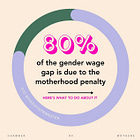Codifying the Value of Your Caregiving Work
how a postnuptial agreement could save your marriage
In my last post, I questioned whether women were done with marriage. The response was overwhelming. I’d struck a nerve. But what about women who are in fulfilling marriages, who don’t want to get divorced? Is there anything they can do to protect themselves while ensconced in an institution that, while exploitative at its core, isn’t something they are ready to leave?
Well, I’d suggest that these women consider a postnuptial agreement.
I’d never heard of this term until I was on a Zoom with a financial advisor. She referred to Melania Trump as the queen of the postnuptial agreement because evidently, every time something changes with Donald Trump’s job or legal woes, Melania has another one drafted. Most recently, she renegotiated before she agreed to any campaigning for this election. Melania, of course, also had a prenuptial agreement or “prenup,” the term we are more familiar with and may think of as only for the ultra-rich or for people who are already preparing for their divorce.
But these contracts need a rebrand. They are not documents that PLAN for divorce. They are documents that PROTECT against a timely, messy and expensive divorce.
Though I will sing the praises of divorce from the rooftops, I do not recommend the PROCESS of divorce. Being divorced = heaven. Getting divorced = hell.
The legal system is complicated, convoluted, antiquated, and overburdened. Divorce lawyers are expensive. Depending on where you live, you can expect to pay a divorce lawyer anywhere from $150-$900 an hour. Prenups and postnups attempt to set forth the details of a potential divorce settlement before goodwill has evaporated, in other words before you are in the process of uncoupling. They aim to protect you from a contested divorce. According to lawyer Aaron Thomas, author of The Prenup Prescription, “a contested divorce is one that goes to litigation because the spouses can’t agree, or “settle,” on spousal support or how to divide their assets and debts.” A divorce of this kind can drag on for years and easily cost six-figures in lawyers fees.
Trust me. You don’t want to go through it.
But these agreements can also do something else. They prod you to sit down and discuss money, labor, and the parameters of your partnership.
Just 15% of married couples sign a prenup. Even if you didn’t sign a prenup, you can establish the very same kind of contract after your marriage ceremony (or amend the terms of your prenup). That’s a postnup. They contain the same content. So why are these contracts important if we weren’t millionaires before marriage and aren’t after?
The prenup or postnuptial agreement specifies what will happen upon divorce in terms of how to split your assets and debts and whether you agree to have spousal support as part of your settlement. And this is an important point. Spousal support is not mandatory. Thus, if your spouse is the higher earner but doesn’t think they should have to pay spousal support, you’d have to take them to court to get a judge to order it. This includes a lot of paperwork, time, and most importantly, legal fees.
ICYMI:
Some higher-earning spouses bristle at paying spousal support. They feel like: we aren’t married anymore. Why should they benefit from my earnings? But if the lower-earning spouse took time off from their career due to caretaking demands (and women are five to eight times more likely to have done this), or downshifted their career to part-time so that they could manage the children and household, spousal support can be framed as the repayment of a loan. The higher-earning spouse is paying the lower-earning spouse back for all the unpaid labor they benefitted from over those years (which according to some calculations, can add up to $183,000 a year).
Without spousal support for some amount of time, the financial reality of divorce can be dire. When mothers who have stepped back from their careers due to caretaking demands get divorced, they find themselves in a bind. Child support rarely covers their expenses. But they have been out of the workforce for years. In addition, they are often still the primary caretaker, so they have to 1) find childcare, a near impossibility right now, so that they can 2) find a full-time job to cover their bills. Depending on how many years they’ve been out of the workforce, this can be a process that takes time.
What will they do in the interim if their ex doesn’t want to pay spousal support and their marital assets (if they have any) are tied up in limbo? I think most women tend to borrow from family or rack up credit card debt.
From my interview with Eve Rodsky, author of Fair Play:
“The truth is that men are able to have the careers they have because of their wives. Unfortunately what happens in the court system all too often is that the men say: well, that was their choice [to downshift to take care of the kids]. They should be able to be self-sufficient. I didn’t make them quit. But what choice is there? We are seeing today with the cost of childcare that 43% of mothers downgrade their careers after they have kids because something has to give, right? A Gavron Warning is something that a judge in California can give to make a wife go out and become self-sufficient so the ex-husband doesn’t have to pay alimony. But they are not factoring in the sacrifice that woman made for her family. Husbands are able to have those careers because of their wives.”
You might have seen that lovely speech by Harrison Butker go viral several months ago. In it, he calls homemaking the most important vocation. And I don’t think any of us would argue that “homemaking” or being the one to tend to the home and children, isn’t important. It is! But not every woman is called to that vocation. A vocation is defined as “a strong feeling of suitability.” And there are certainly women who feel both “called” to be full time caretakers and feel like it suits them. But I don’t think that is the case for 100% of mothers. Butker saying that women should feel that way is like him arguing that all men should feel called to be an NFL player who plays for 5 seconds of every 4 hour game. It’s just not practical or accurate to imply that all men should want to do that job. The same goes from assuming all women should want to be homemakers.
However, when women are sold this line, they feel pressure to sacrifice their careers for their children. Sometimes they do so happily. Oftentimes they do so because there is no other option. But as I wrote about in The Math of Motherhood: The Motherhood Penalty, there are serious financial repercussions to taking a step out of the workforce. You won’t feel them so acutely if you stay married. But if you get divorced? The shit hits the fan.
ICYMI:
If you are a mother who has taken time away from your career to tend to children, you should sit down with your spouse and discuss the need for a postnuptial agreement.
Now, I recognize that this is not an easy conversation to have. But I bet many of you initiated conversations about Fair Play, right? This is the next step. It is a moment to say:
I took one for the team when I downshifted my career to care for the children. It had financial repercussions for me. I hope I will be able to jump back into my career once they get into full time school (or graduate because the school system is not set up for full-time working parents). But I may never recoup my earnings potential from that gap in my employment. My sacrifice has allowed you to continue in your career of choice, accruing earnings, raises, promotions and accolades. I’m so proud of all you have done! But it has happened thanks to my willingness to set my career goals aside.
I love you and do not want this marriage to end. But, in the off chance it does, I would like to have my financial contributions to this family validated by a commitment to spousal support in proportion to the length of time that I took a step back from the workforce.1
You may be thinking: there is no way I could bring this up with my spouse. I get it. I didn’t talk much about money with my spouse either. I have seen over and over in my interviews for The Divorce Diaries that there is often an extreme lack of transparency regarding money in marriages. Several women had credit card debt racked up in their name by their husbands that they were not aware of until they went through divorce proceedings. Others had no idea the level of debt their spouse was in.
Money is one of those taboo topics, like sex. We aren’t taught to talk about it, even with our spouses. We feel shame around our habits, and worry that we don’t have enough (see the similarities?).
This is what is so helpful during the prenup process. Both parties have to provide financial disclosures and show all that they are bringing to the table, both good and bad. If it is a prenup, you can agree that debt accrued pre-marriage will not be shared. Same with some assets.2 But if you are already married, you can’t escape if your spouse has accrued debt during the marriage that you didn’t know about. It is your debt, as well.
The first step of any “nuptial” agreement is having a financial state of the union. You sit down and look at all accounts, mortgages, businesses, savings, credit card bills. The reason why it is helpful to do this officially as part of a legal process is there are legal repercussions if your spouse isn’t fully forthcoming. You are essentially signing a financial affidavit. This process can be helpful even for spouses who have been married for a decade. Is college looming for one of your children? Maybe it is time to set up a 529 and discuss how much you each will commit to saving each month to deposit into that account. Have you always dreamed of moving out of your starter home but never worked towards actually saving for that goal? Is that still something you both want, or would you rather try and make the current home work for your needs?
This can also be a time for you to discuss how your finances are currently set up. Do you have a joint account that both your earnings are deposited into and you both pull from? Do you wish you had a separate account as well so that you had more discretion with what you did with the money you earned and then you could both put a percentage of your earnings into the joint account for shared expenses? I recommend Thomas’s book (The Prenup Prescription) which outlines a variety of different scenarios for this. Yes, for some couples they decide all of this pre-marriage. But there is no reason that you can’t implement some of these strategies now.
Perhaps your spouse has worked full time with an employer who offers matching 401k benefits, while you downshifted to part-time and thus don’t qualify for that benefit. Your spouse likely has accrued more retirement savings. Now, in California, where I live, everything is split 50/50 upon divorce. But if you live in a state that doesn’t have that rule, it might be worthwhile to consider a stipulation in the postnup that you’ll split all retirement accounts because you weren’t able to save as much due to stepping away from the full-time workplace.
I’m not going to pretend that these conversations will be easy. They could, in fact, accelerate an imminent divorce. But if your spouse was lying to you about money, and you lose trust in them due to this revelation, better to know now rather than later, right? If you are worried about having these conversations on your own, they could be held with a marriage therapist. You could also start them with a financial advisor. You can even codify protections against divorce in your postnup, for example, a commitment to a certain number of therapy sessions before either spouse can initiate divorce proceedings.
So can a postnup really save your marriage? No. But it can prompt important conversations that could improve it. And if your marriage disintegrates down the road like so many others, you’ll have some protections in place that put a value to everything you contributed to your family.
As Olivia Dreizen Howell of Fresh Starts says, there is no divorce education in our country, and thus when you all of a sudden find yourself facing one, you must learn a new vocabulary, and fast. I share The Divorce Diaries and what I am learning through my own process so that we all have more knowledge about these systems that can greatly impact us. I am not a lawyer or a financial advisor. But I hope that sharing this information might spare at least one woman the pain of having been out of the workforce for years, providing this gift to her family, only to have such gift positioned as a “choice” upon divorce. Too many women then find themselves terrified and in dire financial circumstances as they seek a job to pay the bills quickly during the emotional upheaval of the separation process.
In fact, this topic is so important that I’m thrilled to be partnering with The Fair Play Policy Institute and Aaron Thomas to create The Fair Play Guide to Prenups and Postnups, so you won’t have to walk this path alone. Stay tuned for more from us on this incredibly important issue.
Did you know that liking this post or leaving a comment helps it find more readers? If you are reading this as an email, there is a heart button at the top and bottom of this email. Click on it and it will take you to the Substack website where you can also leave a comment. If you are reading it online, again, just click the heart button at the top or bottom of this post. I appreciate your support so much!
MORE LIKE THIS:
the legal system grants spousal support for long term marriages (usually at least 8-10 years) and then for half the duration of that marriage.
note that this isn’t super cut and dry. If a house was bought prior to marriage but the joint account pays the mortgages and your joint account funds all improvements to the house, there is a portion of the house that is community property. Again, if this isn’t spelled out in the postnup, you have to hire financial experts to help you determine this amount.











This is so important. It can also get very complex in second or third marriages (which is often when my clients do this as many didn’t see the need as clearly until they got divorced). It is often impossible to adequately compensate women for caregiving work, even if they can obtain support payments.
Really enjoyed it! Thanks for talking about it, would definitely talk about a postnup to instill confidence in my partner, if and when I decide to get married.